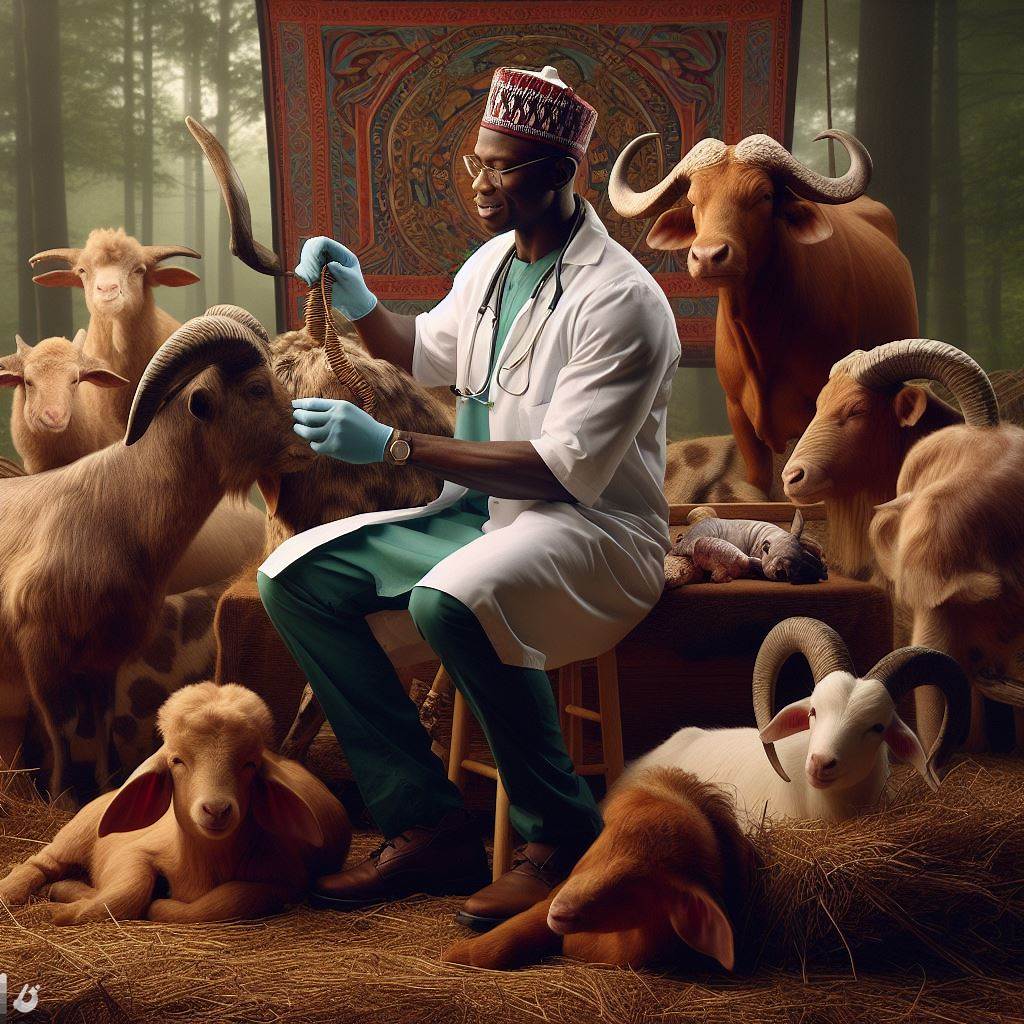Introduction
In this blog post, we will explore Animal Breeding and Genetics in Nigeria Universities.
Definition of animal breeding and genetics
Animal breeding is the science of selecting, mating, and managing animals for improved traits.
Genetics is the study of genes and hereditary characteristics.
Animal breeding and genetics are essential in Nigeria for improving livestock productivity, disease resistance, and overall agricultural development.
Overview of animal breeding and genetics programs in Nigerian universities
Nigerian universities offer various programs in animal breeding and genetics, aimed at equipping students with knowledge and skills to enhance the country’s livestock sector.
However, it is important to note that these programs are still in their early stages, with limited resources and faculty.
Consequently, there is a need for increased investment and collaboration with international institutions to further develop these programs.
In essence, animal breeding and genetics play a crucial role in Nigeria’s livestock industry.
By enhancing the genetic potential of animals, we can improve food security, increase farmer income, and contribute to the overall economic growth of the country.
Therefore, there is a need to prioritize and invest in the expansion and improvement of animal breeding and genetics programs in Nigerian universities.
History of Animal Breeding and Genetics in Nigeria
Early developments in animal breeding and genetics
- Animal breeding and genetics have been practiced in Nigeria for centuries.
- Early breeders focused on selecting animals with desirable traits for breeding.
- Indigenous knowledge played a significant role in the early developments.
- Traditional farmers bred animals to improve productivity, resistance to diseases, and adaptability.
- The selection process was primarily based on visual assessment and performance evaluation.
Evolution of animal breeding and genetics programs in Nigerian universities
Nigerian universities started offering formal animal breeding and genetics programs in the 1960s.
The programs aimed to meet the growing demand for skilled professionals in the field.
Initially, the focus was on basic breeding principles and practical applications.
Over time, the curriculum expanded to include advanced genetic concepts and molecular techniques.
Animal breeding and genetics departments were established in various universities across Nigeria.
Transform Your Career with Expert Guidance
Get personalized mentorship consulting that’s tailored to your unique path. Our expert advice is actionable and exclusive.
Get StartedThe programs integrated both theoretical and practical training to equip students with necessary skills.
Research activities in the field increased, leading to the development of new breeding strategies.
Collaboration with international institutions helped enhance the quality of education and research.
Nigerian breeders and geneticists contributed to the development of national breeding programs.
The importance of animal breeding and genetics in Nigeria’s agriculture sector continues to grow.
Modern technologies like genomics and biotechnology are being incorporated into the programs.
Nigerian animal breeders and geneticists are actively involved in research and knowledge dissemination.
Efforts are being made to integrate indigenous knowledge with modern scientific approaches.
As Nigeria strives to improve its animal production and address emerging challenges, the history of animal breeding and genetics serves as a strong foundation.
From early indigenous practices to the establishment of formal programs in universities, the field has evolved significantly.
Nigerian breeders and geneticists have played a crucial role in developing national breeding programs and implementing modern technologies.
The continuous collaboration with international institutions ensures access to the latest research findings and advancements.
As the country progresses, efforts to bridge traditional knowledge with modern scientific approaches will further enhance animal breeding and genetics in Nigeria.
Read: Agronomy Internships: Top Opportunities in Nigeria Today
Transform Your Ideas Into Impactful Words
Struggling to express your thoughts? Let us craft academic papers, articles, or blog posts that captivate, clarify, and connect with your audience.
Get StartedAnimal Breeding and Genetics Curriculum in Nigerian Universities
Courses offered in animal breeding and genetics programs
Animal breeding and genetics programs in Nigerian universities provide students with a comprehensive curriculum to develop their knowledge and skills in this field.
These programs offer a range of courses that cover various aspects of animal breeding and genetics.
The courses typically include:
- Introduction to Animal Breeding and Genetics
- Principles of Animal Genetics
- Anatomy and Physiology in Animal Breeding
- Quantitative Genetics
- Molecular Genetics
- Animal Biotechnology
- Reproductive Biotechnologies in Animal Breeding
- Selection and Breeding Methods
- Genetic Improvement of Livestock
- Animal Genomics
- Population and Conservation Genetics
- Genetic Diversity and Sustainable Animal Production
These courses provide students with a strong foundation in both theoretical and practical aspects of animal breeding and genetics.
They equip students with the necessary knowledge to contribute to the improvement of animal production in Nigeria.
Practical training and internships
In addition to the theoretical courses, animal breeding and genetics programs also emphasize practical training and internships.
These hands-on experiences allow students to apply their knowledge in real-world settings and gain practical skills.
During their training, students may have the opportunity to work with farm animals, conduct experiments, and analyze genetic data.
They learn how to use advanced technologies in animal breeding, such as artificial insemination, embryo transfer, and molecular markers.
Internships provide students with valuable industry experiences and expose them to different aspects of animal breeding and genetics.
They may have the chance to work with breeders, geneticists, and researchers in livestock farms, research institutions, or government agencies.
Research opportunities in animal breeding and genetics
Animal breeding and genetics programs in Nigerian universities also offer research opportunities for students.
These programs encourage students to conduct independent research projects and contribute to the advancement of knowledge in this field.
Students can choose to focus their research on various areas, such as genetic improvement of specific livestock breeds, genomic analysis of populations, or development of new breeding methods.
Make Your Study Abroad Dream a Reality
Need help navigating the complexities of studying overseas? Let us guide you through the application and visa process, ensuring a smooth journey to your dream destination.
Get StartedThey work closely with faculty members who guide and mentor them throughout the research process.
Research projects in animal breeding and genetics often involve data collection, statistical analysis, and interpretation of results.
Students may also have the opportunity to present their research findings at conferences or publish them in scientific journals.
These research opportunities not only enhance students’ understanding of animal breeding and genetics but also prepare them for further studies or careers in research and academia.
In fact, animal breeding and genetics programs in Nigerian universities offer a diverse curriculum that covers various courses in this field.
Through theoretical courses, practical training, and research opportunities, these programs equip students with the knowledge and skills to contribute to the advancement of animal production in Nigeria.
Read: Student Experiences: Life as an Animal Nutrition Major in Nigeria
Faculty and Research Facilities in Nigerian Universities
Competent faculty members specializing in animal breeding and genetics
Nigerian universities boast highly skilled faculty members who have specialized in the field of animal breeding and genetics.
These professors and lecturers have extensive knowledge and experience in the subject matter.
They keep themselves updated with the latest research and developments in the field.
Students can expect to learn from experts who are passionate about animal breeding and genetics.
The faculty members provide valuable guidance and mentorship to aspiring animal breeders and geneticists.
Research facilities and laboratories available for students
Nigerian universities have well-equipped research facilities and laboratories dedicated to animal breeding and genetics.
These facilities allow students to gain practical experience and conduct experiments related to the field.
Unlock the Full Potential of Your Research
Stuck in your academic research? Whether it’s data analysis, research design, or literature reviews, we offer expert guidance to elevate your work and ensure success.
Get HelpStudents have access to advanced technology and equipment necessary for conducting research and analyzing genetic data.
The laboratories provide an environment conducive to learning and exploration in the field.
Students can collaborate with faculty members and fellow students on research projects, further enhancing their knowledge and skills.
In short, Nigerian universities have competent faculty members and excellent research facilities that support the study of animal breeding and genetics.
The specialized faculty members provide valuable expertise and guidance to students, while the well-equipped laboratories allow for practical learning and research opportunities.
These resources contribute to a comprehensive education in animal breeding and genetics, empowering students to make significant contributions in the field.
Extracurricular Activities and Associations
Student associations for animal breeding and genetics
Joining student associations related to animal breeding and genetics is a great way to enhance your knowledge and skills.
These associations provide a platform to connect with like-minded individuals who share a passion for animal genetics.
By participating in such associations, you can engage in discussions, exchange ideas, and collaborate on various projects and initiatives.
Furthermore, student associations often organize workshops, seminars, and guest lectures by industry professionals, offering valuable learning opportunities.
Being a part of these associations can also help you develop leadership, teamwork, and organizational skills.
Moreover, it allows you to build a strong network within the field, expanding your professional connections and potential career opportunities.
Competitions and conferences related to animal breeding and genetics
Competitions and conferences focusing on animal breeding and genetics provide a platform for students to showcase their skills and knowledge.
Participating in these events allows you to interact with experts in the field, gaining insights and feedback on your work.
Such competitions can include poster presentations, research paper competitions, and animal evaluation contests.
These events encourage innovation and provide a platform for students to contribute to the field through their research and projects.
They also promote healthy competition among students, fostering a spirit of excellence and continuous learning.
Additionally, conferences offer opportunities to attend keynote speeches, panel discussions, and workshops, allowing you to stay updated on the latest advancements in animal breeding and genetics.
Professional networking opportunities
Engaging in extracurricular activities related to animal breeding and genetics opens doors for professional networking.
Attending conferences, seminars, and workshops provides opportunities to connect with professionals, researchers, and industry experts.
Networking allows you to exchange ideas, discuss research findings, and establish collaborations for future projects.
By building a strong professional network, you can expand your knowledge and gain insights into different career paths.
Networking can also lead to internships, job opportunities, and mentorship, enabling you to kickstart your career in animal breeding and genetics.
Moreover, staying connected with professionals in the field through social media platforms or professional online networks keeps you updated on industry trends and developments.
With the support of a robust professional network, you can continue to grow both personally and professionally in the field of animal breeding and genetics.
In general, engaging in extracurricular activities and associations related to animal breeding and genetics offers numerous benefits.
Joining student associations provides a platform for collaboration, learning, and skill development.
Competitions and conferences allow students to showcase their work, gain feedback, and stay informed about industry advancements.
Professional networking opportunities enable students to connect with experts, establish collaborations, and explore career opportunities.
By actively participating in these extracurricular activities, students can enhance their academic experience and strengthen their prospects in the field of animal breeding and genetics.
Read: Challenges and Opportunities in Animal Nutrition Studies in Nigeria

Learn More: Educational Programs for Nigerian Horticulture
Career Opportunities in Animal Breeding and Genetics
Job prospects for graduates in Nigeria
- Research positions in universities and research institutions focused on animal breeding and genetics.
- Government agencies that work on livestock improvement and breeding programs.
- Private farms and livestock companies seeking professionals to enhance breeding practices.
- Consulting firms providing expertise on animal breeding and genetics to various clients.
- Veterinary clinics and hospitals with specialization in genetics and breeding.
- Non-profit organizations involved in animal welfare and conservation efforts.
Industries and sectors that require animal breeding and genetics expertise
- Agriculture and livestock farming sectors that aim to maximize productivity and genetic potential.
- Biotechnology and pharmaceutical companies engaged in genetic research and development.
- Food processing and quality assurance industries with a focus on improving livestock breeds for better meat and dairy production.
- Zoos and wildlife conservation organizations that manage breeding programs for endangered species.
- Equestrian and horse racing industries striving to breed top-performing racing horses.
Further studies and specialization options in animal breeding and genetics
- Master’s and Ph.D. programs in animal breeding and genetics to become researchers and academicians.
- Specialization in molecular genetics, genetic engineering, or genomics for advanced technological applications.
- Epigenetics and environmental effects on animal genetics to understand the interaction of genes and the environment.
- Reproductive technologies and assisted reproductive techniques to improve breeding efficiency.
- Animal genotyping and marker-assisted selection for precise breeding and genetic improvement.
- Development of breeding programs and selection strategies for specific traits in different animal species.
- Integration of bioinformatics and genetics to study and analyze large-scale genomic data.
In review, pursuing a career in animal breeding and genetics in Nigeria offers numerous job prospects and opportunities for specialization.
Graduates can work in research institutions, government agencies, private farms, consulting firms, veterinary clinics, and non-profit organizations.
Industries such as agriculture, biotechnology, food processing, zoos, and equestrian sectors also require expertise in animal breeding and genetics.
Further studies can be pursued through master’s and Ph.D. programs, with specializations ranging from molecular genetics to reproductive technologies and bioinformatics.
By exploring these career options, individuals can contribute to improving animal productivity, conservation efforts, and the overall welfare of livestock populations in Nigeria.
Read: Student Experiences: Pursuing Agronomy in Nigerian Campuses
Uncover the Details: Top Livestock Management Apps for Nigerian Farmers
Challenges and Future Prospects of Animal Breeding and Genetics in Nigeria
Existing challenges facing animal breeding and genetics programs
- Lack of adequate funding for research and development in animal breeding and genetics.
- Inadequate infrastructure and facilities for practical training and experimentation.
- Limited availability of qualified faculty members with expertise in animal breeding and genetics.
- Inadequate access to advanced technologies and tools for genetic analysis and selection.
- Poor collaboration and networking between universities, industry, and research institutions.
- Insufficient awareness and understanding of the importance of genetics in animal production.
- Lack of standardized curriculum and outdated teaching methods.
- Inadequate emphasis on practical application and hands-on training in animal breeding and genetics.
- Inconsistent incorporation of emerging trends and advancements in animal breeding and genetics.
- Limited availability of scholarships and funding opportunities for students pursuing animal breeding and genetics.
Initiatives and reforms to improve animal breeding and genetics education
- Strengthening funding support for research and development in animal breeding and genetics.
- Investing in the establishment of state-of-the-art laboratories and facilities for practical training.
- Recruiting and retaining qualified faculty members with expertise in animal breeding and genetics.
- Collaborating with international institutions to access advanced technologies and tools.
- Enhancing collaboration and networking between universities, industry, and research institutions.
- Increasing awareness campaigns to highlight the importance of genetics in animal production.
- Updating and standardizing the curriculum to incorporate current knowledge and practices.
- Implementing active learning methods, such as case studies and practical projects, in teaching.
- Organizing workshops and seminars to introduce emerging trends and advancements.
- Creating more scholarship programs and funding opportunities for students in animal breeding and genetics.
Potential growth and future prospects for animal breeding and genetics in Nigeria
- Increased adoption of advanced genetic technologies can lead to improved animal productivity and performance.
- Enhanced breeding programs can contribute to the development of superior genetic lines specific to Nigeria’s environment.
- Improved animal genetics can increase resistance to diseases and adverse environmental conditions.
- Increased awareness and education on animal breeding and genetics can lead to better farm management practices.
- Economic diversification through the export of superior genetics can boost Nigeria’s agricultural sector.
- Government support and investment in animal breeding and genetics can stimulate research and innovation.
- Collaboration between academia, industry, and government can lead to the development of market-driven animal breeding solutions.
- Sustainable utilization of indigenous animal genetic resources can contribute to biodiversity conservation.
- Integration of genomics into breeding programs can accelerate genetic gain and improve efficiency.
- A well-established animal breeding and genetics sector can attract skilled professionals and foreign investment.
In a nutshell, animal breeding and genetics in Nigeria face several challenges, including inadequate funding, infrastructure, and expertise.
However, through initiatives such as improved funding, infrastructure, curriculum, and collaboration, the future prospects for animal breeding and genetics in Nigeria are promising.
The potential for growth lies in the adoption of advanced technologies, enhanced breeding programs, increased awareness, and government support, leading to improved animal productivity, disease resistance, and economic diversification.
Explore Further: Technological Advances in Nigerian Wildlife Management
You Might Also Like: Top Universities Offering Wildlife Management in Nigeria
Conclusion
Recap of the importance of animal breeding and genetics in Nigeria
Animal breeding and genetics play a crucial role in Nigeria’s agricultural development.
By utilizing these practices, farmers can improve the quality and productivity of their livestock, leading to increased food production and economic growth.
Encouragement for aspiring students to consider animal breeding and genetics programs in Nigerian universities
For students interested in the field of animal breeding and genetics, pursuing a degree in this area can open up exciting career opportunities.
Nigerian universities offer comprehensive programs that provide a solid foundation in the principles and applications of animal breeding and genetics.
By studying animal breeding and genetics, students can contribute to the advancement of agriculture in Nigeria and help address the challenges faced by the sector, such as improving animal health, enhancing genetic diversity, and increasing livestock productivity.
Furthermore, the demand for skilled professionals in animal breeding and genetics is expected to grow, providing graduates with excellent job prospects in both the public and private sectors.
The field offers a dynamic and rewarding career path that combines scientific knowledge with practical applications.
Therefore, aspiring students are encouraged to consider animal breeding and genetics programs in Nigerian universities to acquire the skills and knowledge necessary to make a significant impact on the country’s agricultural sector and contribute to its overall development.




